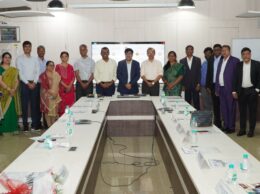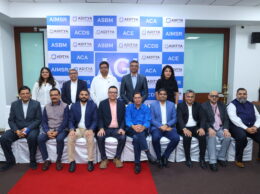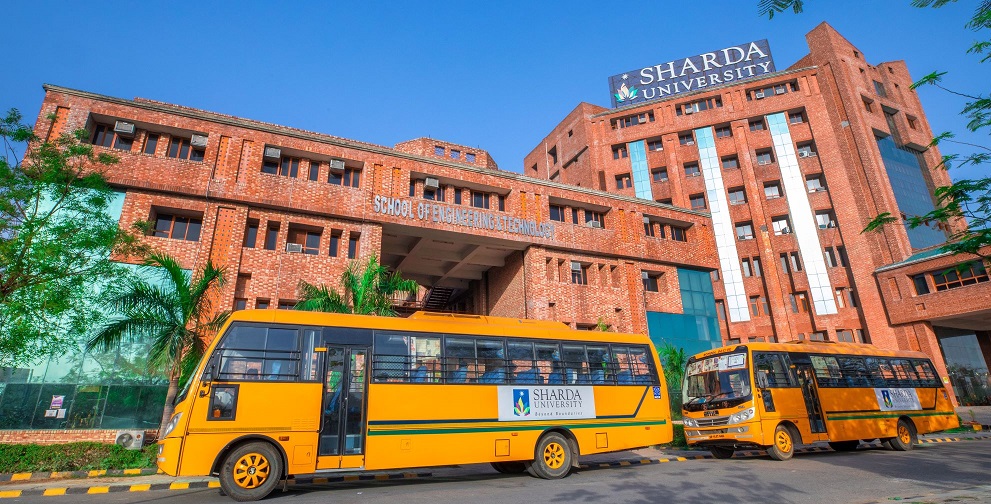CHENNAI : A total of 2,636 students graduated during the 61st Convocation of Indian Institute of Technology Madras (IIT Madras), which was held in the campus today (19th July 2024). As many as 3,016 Degrees (including Joint and Dual Degrees) were awarded to the students on the occasion.
A total of 444 PhDs were awarded, which included PhDs, Joint Degree Ph.Ds with foreign institutions and Dual Degree PhDs.
A Highlight of the Occasion was Shri S. Somanath, Chairman, ISRO, receiving his PhD in Mechanical Engineering during the Convocation.
The Convocation Event can be viewed on the following link – https://www.youtube.com/watch?v=CklnaAj58QI
IIT Madras has had an eventful year, with many major milestones, the top three being the establishments of Wadhwani School of Data Science & AI and School of Interdisciplinary Studies besides the launch of Agnibaan rocket. The Department of Data Science and AI housed in the Wadhwani School of Data Science and AI, which was generously funded by IIT Madras Distinguished alumnus Mr. Sunil Wadhwani, will work on impactful problems of direct relevance to the society.
The International Interdisciplinary Master’s degree programs (I2MP) with innovative curricula to equip students with cutting-edge expertise and skills that transcend traditional engineering domains was launched in 2022. The first batch of I2MP is graduating at this Convocation.
The I2MP receives over 200 applications annually from diverse backgrounds and countries, including Ethiopia, Mauritius, Syria, and Nepal. These students study several core and elective courses at IIT Madras, in addition to a research project in their area of interest.
The Chief Guest was Dr. Brian K. Kobilka, who was awarded the Nobel Prize in Chemistry 2012. Dr. Pawan Goenka, Chairman, Board of Governors, IIT Madras, presided over the Convocation in the presence of Prof. V. Kamakoti, Director, IIT Madras, faculty, staff and students.
Dr. Brian K. Kobilka and Robert Lefkowitz discovered that the receptor was similar to receptors located in the eye that capture light. It was later discovered that there is an entire family of receptors that look and act in similar ways–G-protein-coupled receptors. Approximately half of all medications used today make use of this kind of receptor.
Congratulating the graduating students and prize winners, Dr. Brian K. Kobilka, who was awarded the Nobel Prize in Chemistry in the year 2012, said, “I do not consider myself to be exceptional in any way. My career today is an example of how an average individual can achieve a measure of success by a combination of factors including hard work, persistence, an element of luck and a great deal of help from family, friends and colleagues. When I look back at my career, I am amazed by how often I was in the right place at the right time, with the right people.”
Dr. Brian K. Kobilka added, “I believe that there are five factors that played an important role in my career. First, I found my passion. Something I loved to do. A challenging goal that I wanted to pursue. Second, I was able to find role models and mentors who provided guidance at different stages of my career. Third, I recognized my strengths and weaknesses and found ways to leverage my strength and accommodate for my weaknesses. Fourth, I had balance in my life. A fulfilling family life outside of my academic career. Finally and fifth, possibly the most important, I was not afraid to fail. I found ways to learn from my failures.”
“A major goal when I began my independent career in 1990 was to obtain structures of the structures of G-protein-coupled receptors in active/inactive states. It took 21 years to achieve goal and ultimately led to my being awarded the Nobel Prize. During those 21 years, I learned many things about how these receptors work from my many failed experiments,” said Dr. Brian K. Kobilka.
DEGREES BREAK-UP
During this Convocation, Prof. V. Kamakoti, Director, IIT Madras, awarded degrees to 2,636 graduates including 764 B.Tech (of whom 27 with Honours), 277 Dual Degree B.Tech and M.Tech, 481 M.Tech, 151 M.Sc, 42 M.A, 50 Executive MBA, 84 MBA, 236 M.S, and 107 Web-enabled M.Tech for executives. The above PhD numbers also include 07 joint degrees with universities in foreign countries including Australia, Singapore, France and Germany.
Congratulating the graduating students, Dr. Pawan Goenka, Chairman, Board of Governors, IIT Madras, said, “India has already become a magnet for investments across various industries, ushering in an era of unprecedented opportunities. This is leading to a remarkable transformation and is steering us towards becoming a ‘Viksit Bharat’ – a developed India by 2047. This vision, championed by our Honourable Prime Minister Shri Narendra Modi, reflects a collective national ambition. The Indian economy is advancing rapidly. A decade ago, India ranked as the 10th largest economy globally, today it is 5th, and will soon become 3rd. India aspires to become a $30 -$35 trillion economy by 2047, on its way to Viksit Bharat.”
Further, Dr. Pawan Goenka said, “However, Viksit Bharat will not happen simply by wishing it. Achieving this vision relies heavily on us collectively taking bold, transformative actions. Viksit Bharat will be possible only if the governments, businesses, entrepreneurs, and professionals like you – make significant and audacious moves and Take Big Bets…Disruptions that reshape industries, countries and redefine paradigms can be caused only by taking big bets. If you find that you have never failed, it should give you a pause not satisfaction. It likely means you have played it safe, too safe to step beyond your comfort zone.”
Dr. Pawan Goenka added, “Today, India is placing big bets in ground-breaking technologies across digital, fintech, space research, health-tech, and other areas. The road to Viksit Bharat will come from Technology and Innovation. And this is where you, the graduating class of IIT Madras, can play a big role. You can create building blocks of inclusive growth by leveraging technology. India needs robust, accessible, and innovative technology solutions. Young Indians like you will be the architects, the builders, the dreamers, and the doers of Viksit Bharat. You are the ones who will bridge the gap between the aspirations and reality, who will tackle the challenges of tomorrow, and who will transform this vision into action. Hence, as you leave these prestigious halls, remember, you’re not just engineers or technologists; you are the visionaries, the creators, and the architects of our future.”
IIT Madras was designated as an ‘Institute of Eminence’ in early 2020. The special grant that came with it is primarily being used to give a sharp impetus to research activities. Through an internal competitive process, the Institute identified for support nearly many research initiatives grouped under clusters, ranging from AI and Data Sciences to Safety Science and Systems, and Sensing and Vision.
Presenting the Director’s Report, Prof. V. Kamakoti, Director, IIT Madras, said, “This year IIT Madras has exceeded its target of one patent a day by filing 419 patents during the year, of which 85 are international filings, and were granted 445 Indian and 15 international patents. The IITM Incubation Cell, the nodal incubator of IIT Madras and spearheading country’s leading deep tech startup hub, marked the beginning of 2024 on a jubilant note – a total portfolio of 365 startups, cumulatively valued at INR 45,000 Crores (US$5.4 Billion, based on investments raised from angels/VCs). The goal for the fiscal year 2024-25 is to incubate 100 more, focusing on areas such as space, manufacturing, robotics, Assistive Tech, climate-tech, fintech and AI.”
Prof. V. Kamakoti added, “In 2023-24, the Institute received sanction for 331 Ministry-sponsored projects for a total value of INR 568.21 crores. Our strong industry collaboration is evident from the 883 consultancy and industry-sponsored research projects received this financial year amounting to INR 584.87 crores. The above is inclusive of around 130 international projects funded by foreign entities.”
Following the Main Convocation in the morning, Department Degree Distribution Programmes (D3P) were held in the various academic departments, where graduating students were conferred their degrees in person








